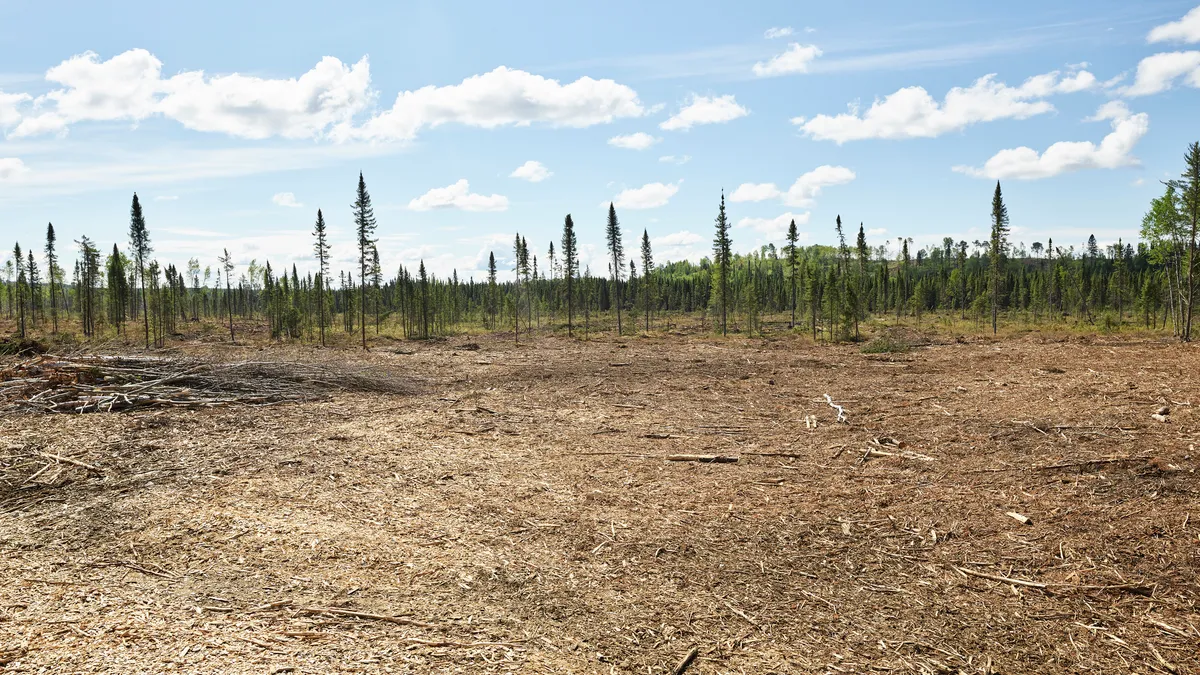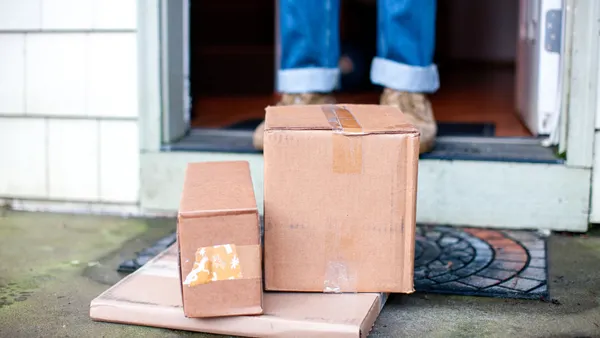Dive Brief:
- Hershey has enacted a companywide policy to end deforestation across its supply chain by 2030, according to an announcement Monday.
- The order applies to all Hershey's raw material suppliers, and any non-compliant supplier runs the risk of suspension or removal from the sweets manufacturer's supply chain.
- The company also committed to reduce its "absolute" scope 3 emissions 25%, based on numbers from 2018, and decrease packaging weight by an additional 25 million pounds by 2030, as part of its environment, social and governance agenda.
Dive Insight:
Hershey's plans to end deforestation across all its raw material supply chain is a switch from its commodity-by-commodity approach in the past. This revised, holistic view puts more responsibility on direct and indirect suppliers to ensure their growing and sourcing practices are inline with the company's goal. And the penalty for not complying could be as steep as termination.
Deforestation action is key to reaching its goals of lowering scope 3 and overall emissions of greenhouse gases by 2030, Hershey said. But without supplier buy-in, that is nearly impossible. So, Hershey has created a list of requirements that suppliers must abide by to avoid any corrective action.
Suppliers cannot create any new developments on peatland, illegally harvest any forest-based commodities, and should reforest or restore natural ecosystems where relevant, among other deforestation-specific requirements.
Stipulations for supply chain transparency include resolving conflicts and complaints, and engaging in "multi-stakeholder collaborations" to end deforestation. Hershey also included human rights guidelines in the policy for suppliers to "respect and uphold land tenure rights of individuals, Indigenous Peoples and local communities."
While all Hershey's agricultural supply chains will be impacted by the new policy, it has put specific focus on cocoa, palm oil, soy, and pulp and paper for packaging — the supply chains that account for the greatest risk of deforestation, according to Hershey. The company also committed to convert 100% of its plastic packaging to recyclable, reusable or compostable by 2030.
"We will continue to use our scale and apply the full force of our business to reduce our greenhouse emissions and drive climate action forward," Hershey CEO Michele Buck said in a press release.
Hershey previously established an agroforestry landscape program in Ghana, aimed at reducing deforestation in its cocoa supply chain as part of a 2018 $500 million commitment. At the time, the company also committed to reforestation by distributing roughly 7.4 million cocoa trees and 921,000 shade trees.
Company commitments to reduce emissions, end deforestation, reduce waste and other environmentally friendly actions have been popping up across supply chain policies. With customer demands for sustainability, and pandemic-induced challenges to sourcing and obtaining goods, brands are trying to gain more control over their supply chains by implementing sustainable practices, hoping to save money in the long run by mitigating environmental impacts and disruptions.
To get there, brands have been scaling up technology to better trace and map their supply chains, and their suppliers'. VF Corporation — the parent company of The North Face, Timberland and Vans — has a data collection process that allows for end-to-end supply chain tracing, from raw materials to product distribution.
Unilever is converting over to using more recycled plastic, and Mars reduced its palm oil mill count last year in its efforts to reduce deforestation.
But sometimes companies fall short of their announced goals. In 2020, Nestlé and Procter & Gamble admitted they would miss their 10 goals to rid deforestation from their supply chains by 2020. And a 2019 Greenpeace report stated that companies were not releasing progress on their sustainability pledges. Kraft Heinz, Kellogg and Hershey were three of the companies listed in the report.
Hershey was named by The Rainforest Action Network in 2018, along with Mars, Nestlé, Unilever and others, for sourcing from a palm oil supplier linked to forced labor. At the time, Hershey said that it immediately began an investigation after learning of the forced labor allegation and said it would not "hesitate to take the adequate measures such as suspension or removal of a mill or producer."
This story was first published in our weekly newsletter, Supply Chain Dive: Procurement. Sign up here.















